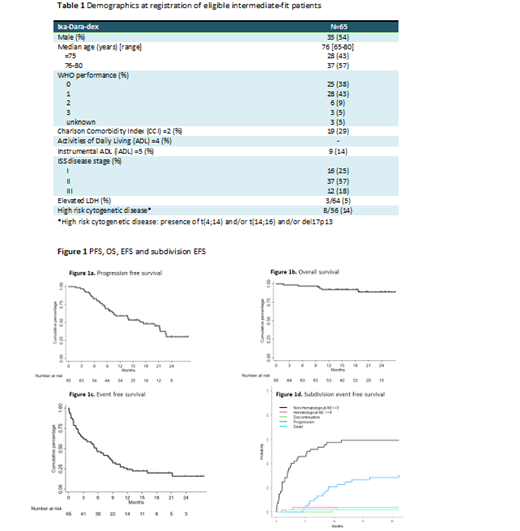Abstract
Introduction
Non-transplant eligible newly diagnosed multiple myeloma (NTE-NDMM) patients have a heterogeneous clinical outcome, which can be partly explained by differences in frailty level. Accordingly, intermediate-fit patients, according to the IMWG frailty index, have an inferior survival and higher rates of treatment discontinuation as compared to fit NTE-NDMM patients. The aim of this study was to prospectively investigate the efficacy and tolerability of the novel regimen ixazomib-daratumumab-low dose dexamethasone in intermediate-fit NTE-NDMM patients. This trail is registered at www.trialregister.nl as NTR6297.
Methods
In the phase II HOVON 143 study, intermediate-fit NTE-NDMM patients were treated with nine 28-day induction cycles, consisting of ixazomib 4mg (day 1, 8, 15), daratumumab 16mg/kg (cycle 1-2 on day 1, 8, 15, 22; cycle 3-6 on day 1, 15; cycle 7-9 on day 1) and dexamethasone (on days of daratumumab; cycle 1-2 20mg, subsequent cycles 10mg), followed by maintenance therapy of 8-week cycles with ixazomib (days 1, 8, 15, 29, 36, 43), and daratumumab (day 1), of maximum 2 years or until earlier progression.
Inclusion criteria were NTE-NDMM patients who were intermediate-fit according to the IMWG frailty index. Main exclusion criteria were severe cardiac dysfunction, chronic obstructive pulmonary disease with an FEV1 <50% of expected and a creatinine clearance of <20 ml/minute.
The primary endpoint was overall response rate (ORR) after nine induction cycles, defined by having at least a partial response (≥PR). Secondary endpoints were PFS, OS, event free survival (EFS, defined as either treatment discontinuation, progressive disease (PD), death, hematological adverse events (AE) grade 4 or non-hematological AE grade 3/4), and health-related quality of life (using the EORTC-QLQ C30 and -MY20).
Results
Sixty-five NTE-NDMM patients were included in the study of whom the demographics are described in Table 1. Median age was 76 years (range 65-80), 14% had a WHO≥2, 18% had ISS3 and 14% had high-risk cytogenetic abnormalities.
The ORR was 71% (95% CI 63-73), including 23 (35%) patients with a very good partial response and 1 (2%) with a complete response. After a median follow-up time of 18.1 months (range 9.5-27.8), the median PFS was 17.4 months (95% CI 10.4-22.6), the median OS was not reached and 12-month OS was 92% (95% CI 82-97)(Figure 1). Eight patients died, 3/65 (5%) due to relapse and 5/65 (8%) due to other reasons, including one early death (≤60 days from registration). The median EFS was 5.3 months (95% CI 2.8-8.3). EFS defining events were non-hematological AEs grade 3/4 in 31 (48%), PD in 15 (23%), hematological AEs grade 4 in 2 (3%), treatment discontinuation in 2 (3%) and death in 1 (2%) patients (Figure 1).
Thirty/65 (46%) patients did not proceed to maintenance therapy, due to PD (19/65 (29%)), toxicity (4/65 (6%)), incompliance (3/65 (5%)), sudden death (1/65 (2%)) or other reasons (3/65 (5%)). In addition, 7/65 (11%) patients had to discontinue ixazomib-only, all 7 due to PNP.
Cumulative grade 3 or higher hematological AEs occurred in 8/65 (12%), mainly neutropenia (6%), whereas grade ≥3 non-hematological AEs were reported in 33/65 (51%) patients. Most common non-hematological grade ≥3 AEs were gastro-intestinal (14%), central nervous system AEs (11%) or infections (9%). Of 27/65 (42%) patients experiencing PNP, 4 (8%) had PNP grade 3.
During induction, patients experienced a statistically and clinically (reaching minimal important difference thresholds) significant improvement in GHS/QoL, role functioning, and future perspective. In contrast, PNP worsened over time.
Conclusion
In intermediate-fit patients, ixazomib, daratumumab and dexamethasone is an effective and feasible regime, which improves QoL. However, treatment discontinuation due to toxicity (either the whole regimen (6%), but especially ixazomib only (11%)) or incompliance, which negatively affects PFS, remains a concern. This underscores the need to investigate novel monoclonal antibody-based treatment combinations with a higher efficacy to tolerability balance for intermediate-fit patients with NDMM.
Vekemans: Amgen: Membership on an entity's Board of Directors or advisory committees; Celgene: Membership on an entity's Board of Directors or advisory committees; Bristol Myers Squibb: Membership on an entity's Board of Directors or advisory committees; Janssen: Membership on an entity's Board of Directors or advisory committees; Takeda: Membership on an entity's Board of Directors or advisory committees. van de Donk: Janssen Pharmaceuticals: Membership on an entity's Board of Directors or advisory committees, Research Funding; Takeda: Membership on an entity's Board of Directors or advisory committees; Cellectis: Research Funding; Servier: Membership on an entity's Board of Directors or advisory committees; Amgen: Membership on an entity's Board of Directors or advisory committees, Research Funding; Adaptive Biotechnologies: Membership on an entity's Board of Directors or advisory committees; Celgene: Membership on an entity's Board of Directors or advisory committees, Research Funding; Bristol Myers Squibb: Membership on an entity's Board of Directors or advisory committees, Research Funding; Novartis: Membership on an entity's Board of Directors or advisory committees; Roche: Membership on an entity's Board of Directors or advisory committees; Bayer: Membership on an entity's Board of Directors or advisory committees. Timmers: Gilead Sciences: Other: Travel, Accommodations, Expenses; Daiichi Sankyo Ned: Membership on an entity's Board of Directors or advisory committees; Servier: Speakers Bureau; Janssen-Cilag: Membership on an entity's Board of Directors or advisory committees; Novartis: Speakers Bureau. Sonneveld: Karyopharm: Consultancy, Honoraria, Research Funding; Janssen: Consultancy, Honoraria, Research Funding; Celgene/BMS: Consultancy, Honoraria, Research Funding; SkylineDx: Honoraria, Research Funding; Amgen: Consultancy, Honoraria, Research Funding; Takeda: Consultancy, Honoraria, Research Funding. van der Spek: Amgen: Other. De Waal: Celgene: Speakers Bureau; Roche: Other: Travel, Accommodations, Expenses. Nijhof: Janssen: Membership on an entity's Board of Directors or advisory committees; Celgene/Bristol Myers Squibb: Membership on an entity's Board of Directors or advisory committees. Levin: Roche, Janssen, Abbvie: Other: Travel Expenses, Ad-Board. Zweegman: Oncopeptides: Membership on an entity's Board of Directors or advisory committees; Sanofi: Membership on an entity's Board of Directors or advisory committees; BMS: Membership on an entity's Board of Directors or advisory committees; Takeda: Membership on an entity's Board of Directors or advisory committees, Research Funding; Janssen: Membership on an entity's Board of Directors or advisory committees, Research Funding.


This feature is available to Subscribers Only
Sign In or Create an Account Close Modal